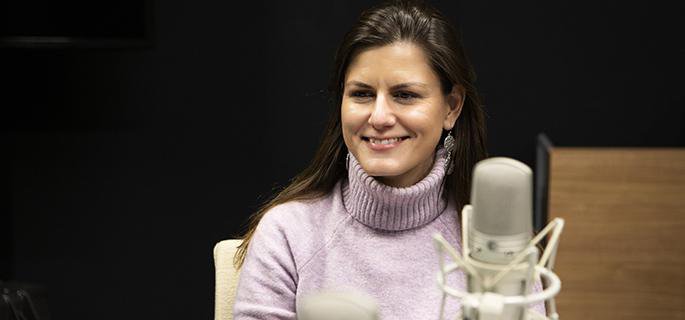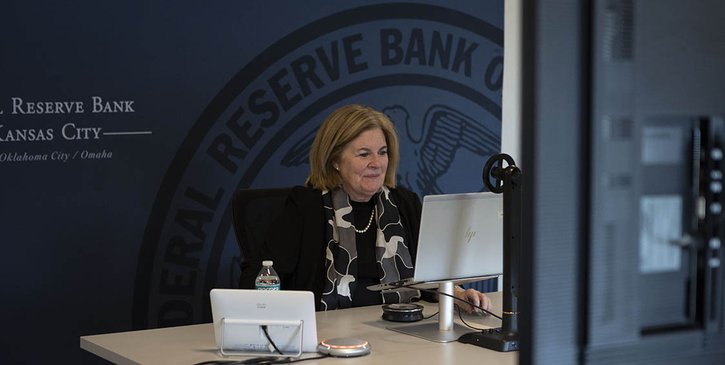An informal lunch meeting a few years ago of women economists in the Tenth District has launched into a bigger initiative, with the potential to inspire economists throughout the Federal Reserve System.
The Kansas City Fed recently hosted its first “Women in System Economic Research Conference,” a two-day event designed to bring together economists throughout the Federal Reserve System to build camaraderie and make connections; present papers written by women economists and allow for question-and-answer sessions; and discuss common career path challenges. These same basic tenets provided the original inspiration for those initial lunchtime networking sessions.
“I really appreciate when we can talk about the issues we are facing—not necessarily gender issues—but research issues, work life balance issues, how to advance our research, what are we working on and things along those lines,” said Didem Tüzemen, a senior economist at the Federal Reserve Bank of Kansas City and one of the organizers of the event.

Kansas City Fed Senior Economist Didem Tüzemen and Senior Policy Advisor Alison Felix (pictured at top) organized the conference.
Increasing diversity
It seems that others in economics were clamoring for the same type of interaction. More than 200 participants from throughout the System registered for the conference.
In her opening remarks, Kansas City Fed President Esther George noted that the conference was an important effort related to further expanding diverse gender representation in economics.
“The Federal Reserve System has made progress toward increasing gender diversity among economists in recent years, and we hope that by highlighting the research of women economists and creating opportunities for collaboration and mentorship, the Women in System Economic Research conference is well positioned to further this progress as we attract and retain a more diverse workforce for years to come,” she said.
Vaishali Garga, an economist at the Federal Reserve Bank of Boston who presented her paper, “Fiscal Expansions in the Era of Low Real Interest Rates,” during the first day of the conference, appreciated being part of it.
Garga said the lack of diversity in economics, particularly gender diversity, is a bigger problem in academia than it is in the Federal Reserve System, where she regularly interacts with women economists and women in senior leadership positions. One of her favorite sessions of the conference was an interactive panel discussion among women in senior positions in economics in the System.
“The panelists were sharing very honest stories, honest struggles—which is not to say that men don’t go through the same struggles,” she said, noting that one story shared related to whether or not the panelist would take on a new role in her organization and weighing the pros and cons of her options.
“Some of the things they said were good to absorb not just because they are women but because they are in leadership.”
The panel discussion helped the organizers achieve one of their goals for the conference: provide women in economics with a supportive group to help them build and grow their careers.
“I think this conference provides another level of support for women economists,” said Alison Felix, a senior policy advisor at the Kansas City Fed, and an organizer of the conference. “As a woman economist or as a younger economist it’s always nice to learn from women in the organization in more senior positions and what paths they have taken.”
One of the panelists, Anna Paulson, executive vice president and director of research at the Federal Reserve Bank of Chicago, shared her advice on how to frame decisions related to career paths.
“Think of your career not just in goals but in terms of experiences,” Paulson said. “Do I want to lead a team? Do I want to do research? More experiential things are going to teach you about other paths you want to pursue—and that’s important to think about as you evaluate new opportunities as they come your way.”
Garga moderated a breakout session for research associates that offered advice on how to be successful in a Ph.D. program. During that session, one economist offered that she would be happy to share her story of having a baby during her fourth year of graduate school.
“No one asked her about it, but the fact she was open to talking about it seemed like something that wouldn’t have happened at a regular conference,” she said.
Felix noted that the driver behind the breakout and networking sessions was recognizing that the economics profession needs to create avenues for women to build networks to help them get their papers published and share research among a wider audience.
Garga said she was able to gain some exposure, which is important to her as an early-career economist.
“I thought it was very fruitful time,” she said. “I think it was definitely well organized and it was refreshing in that sense in that I genuinely enjoyed and benefitted from all of the sessions.”
Learn more about career opportunities in economic research.

Kansas City Fed President Esther George noted the importance of “highlighting the research of women economists and creating opportunities for collaboration and mentorship.” Photo by Gary Barber
